Nowhere to Call Home: The Plight of Israel’s Bedouin Communities
 Tuesday, May 1, 2012 at 11:21PM
Tuesday, May 1, 2012 at 11:21PM by Lawrence Lai
May 1, 2012 12:05pm
Italian photographer Giuliano Camarda visited the Arab al-Jahalin tribe of Palestinian Bedouins in October 2011 and discovered what he describes as a people who have shown great determination and impressive resilience despite their hardships. He documented the lives of the residents in his stark and riveting “Forced Ethnic Relocation” photo essay.
About 20 Palestinian Bedouin communities make up the Arab al-Jahalin, living between Jerusalem and Jericho, in the occupied West Bank. In the West Bank’s Area C, where many of the communities are located, Israel retains control over security as well as planning and zoning.
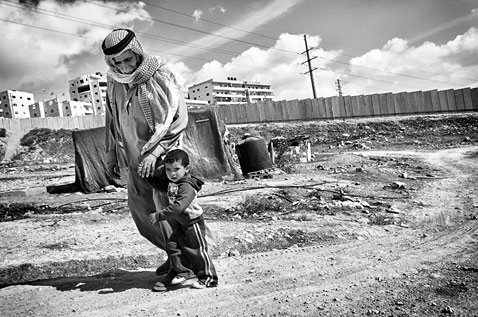
Abu Jouseph, Muktar – or village leader – of the Ras Al Bihad Bedouin community, walks with a child. In 2009 the area was fenced in by a security wall making the lone access route to the village through a military checkpoint. (© Giuliano Camarda/Redux)
The tribe was originally from the Negev desert, west of the Dead Sea, from which they either fled or were pushed out after the creation of the state of Israel in 1948. They maintained their semi-nomadic lifestyle until most of their land was confiscated following Israel’s victory in the 1967 Six-Day War and they were made to relocate to where they’ve now lived for over 40 years.
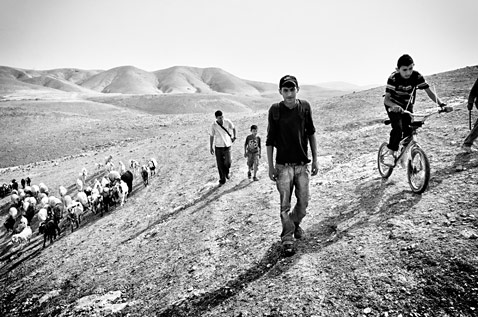
A group of Bedouins from the Khan Al Ahmar community herd sheep in the Judean desert. (© Giuliano Camarda/Redux)
In 1996, the Israeli High Court voted to evict the Bedouins to allow the expansion of the Ma’ale Adumim settlement, but they were eventually permitted to lease the state land that had previously belonged to the Palestinian town of Abu Dis.
Living without electricity, sanitation, running water or medical facilities, the Arab al-Jahalin communities endure a harsh existence. They graze their sheep between garbage and debris, said Carmada, and despite the court’s decision to permit them to lease the land, over the past 15 years, they have been subject to demolition of homes, requisitions of their livestock, and attacks by Israeli settlers.
Then, in November 2011, the Israeli Civil Administration drafted plans to move the Bedouin communities next to the Jerusalem municipal garbage dump, the largest repository of waste in the area. According to a Dec. 6, 2011, article in the British newspaper The Guardian, the communities weren’t notified of the relocation plans.
The Bedouins say the move would jeopardize their lifestyle as nomads, denying them land to tend to their livestock, and expose them health hazards. On April 17, 2012, a film was released, directed by Harvey Stein and produced by Angela Godfrey-Goldstein, about the plight of the al-Jahalin.
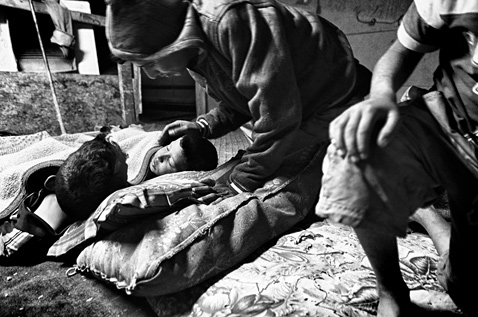
Nasser, 18, watches Mohammad, 8, sleeping at the Khan Al Ahmar Bedouin community. (© Giuliano Camarda/Redux)
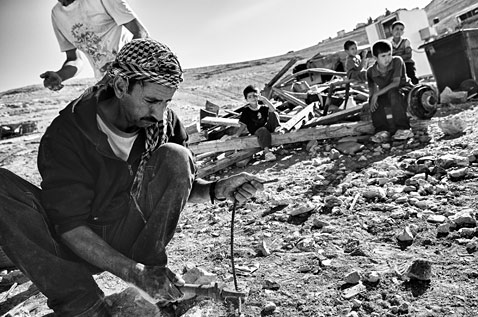
Mosa Hammad, 43, works on parts of a car in the Wadi Abu Hindi Bedouin community. (© Giuliano Camarda/Redux)
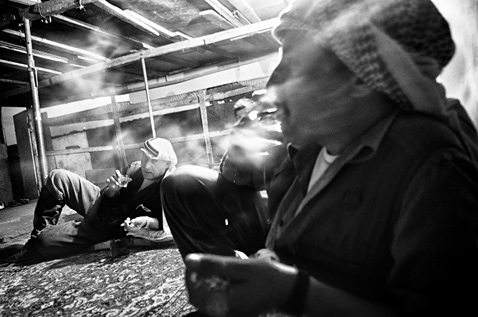
Men relax and smoke cigarettes in a tent at the Ar’ara community. (© Giuliano Camarda/Redux)
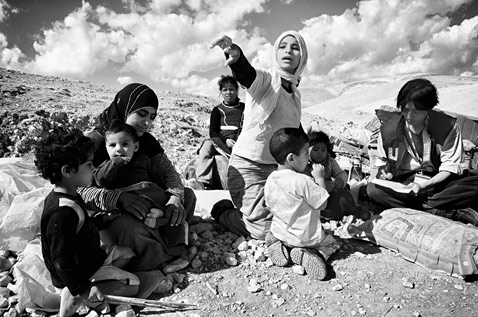
A Bedouin family speaks with a U.N. representative after a demolition operation by Israeli military forces. (© Giuliano Camarda/Redux)
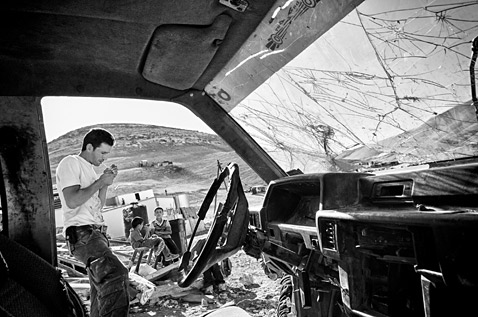
Ibrahim takes a cigarette break while repairing a car in Wadi Abu Hindi. (© Giuliano Camarda/Redux)
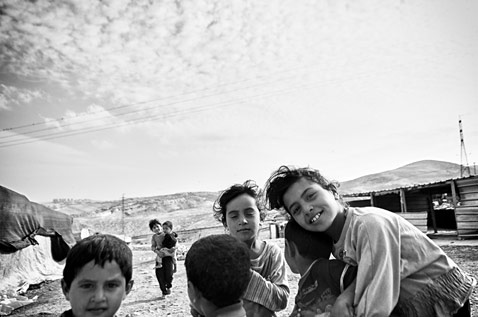
Children at the Ghawaliya Bedouin community. (© GiulianoCamarda/Redux)
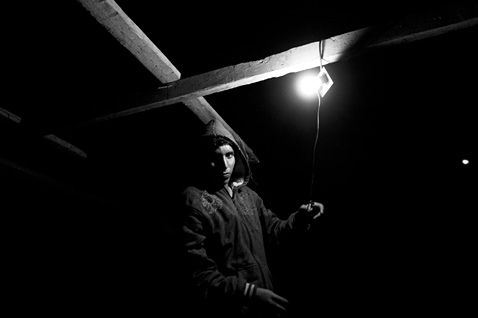
Nasser, 18, is illuminated by a light bulb in Khan Al Ahmar. (© GiulianoCamarda/Redux)
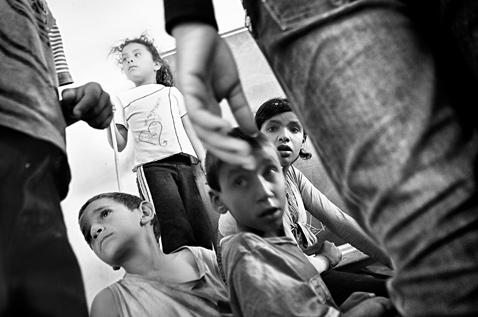
Children participate in recreation activities in the bamboo school built by the Italian Non-Governmental Organization (NGO) “Vento di Terra,” in the Wadi Abu Hindi Bedouin community. (© Giuliano Camarda/Redux)
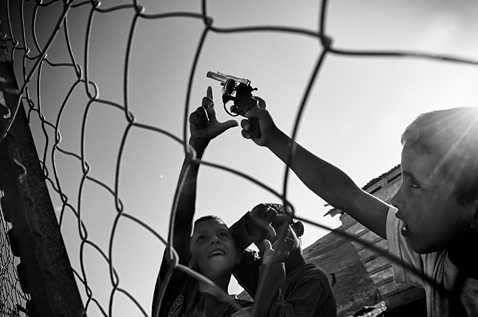
Children play with a toy gun in Khan al Ahmar Bedouin. (© GiulianoCamarda/Redux)
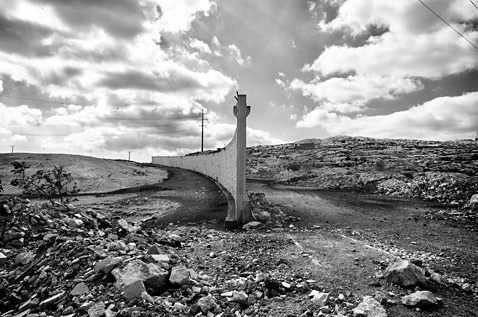
The security wall at the entrance to the Palestinian town of Anata. (© Giuliano Camarda/Redux)
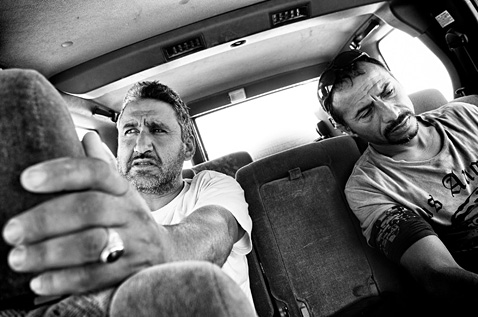
Abu Hammad, 45, and Youseph Mosallam, 44, from the Wadi Abu Hindi Bedouin community. Most men are unemployed and because of theiridentification as Palestinian, have difficulty finding work in Israeli areas. (© Giuliano Camarda/Redux)
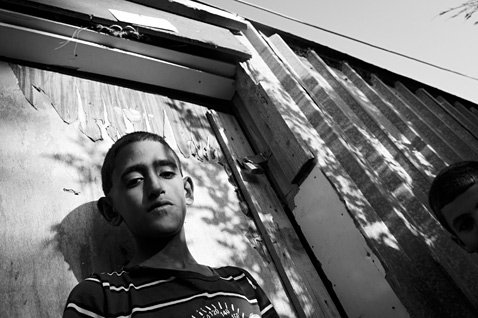
Hammad, 12, in Wadi Abu Hindi. (© Giuliano Carmada/Redux)
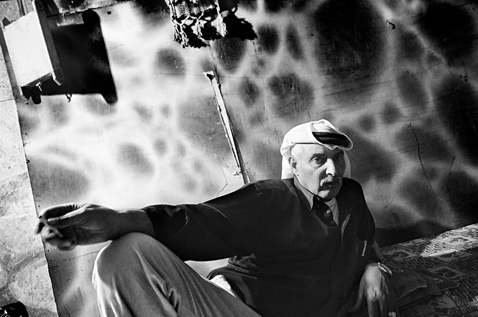
Abu Raed, Mukhtar of the Ara’ra community is shown in his tent. (© Giuliano Camarda/Redux)
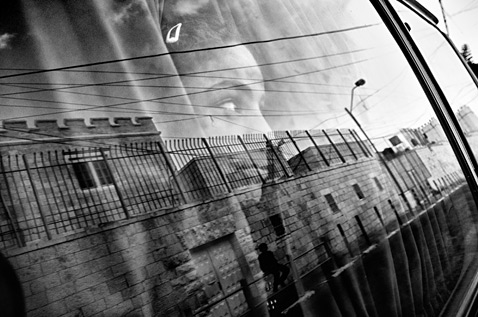
Nora, 11, from Khan al Ahmar, looks out of a window while on a bus trip to visit Jerusalem for her first time. (© Giuliano Camarda/Redux)
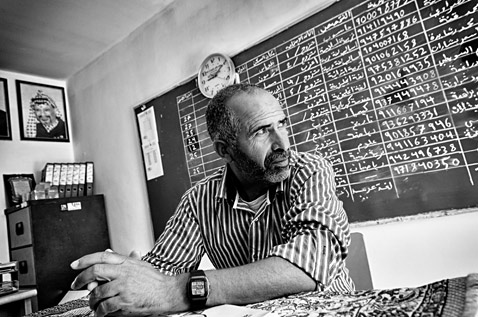
Mohammad al-Korshan is the representative of the Bedouin Palestine refugee population in the West Bank. In May 2011, he took part in the annual meeting on indigenous peoples at U.N. Headquarters in New York, calling for the recognition of West Bank Bedouins’ rights. (© GiulianoCamarda/Redux)
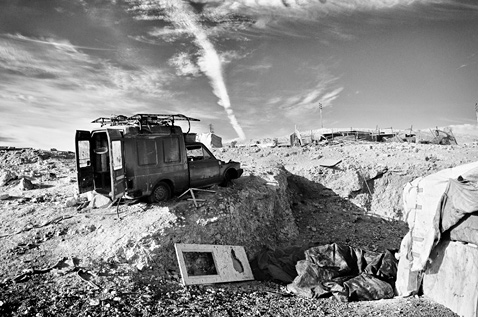
The carcass of a broken-down truck is consumed by the desert at the Khan Al Ahmar bedouin community. (© Giuliano Camarda/Redux)
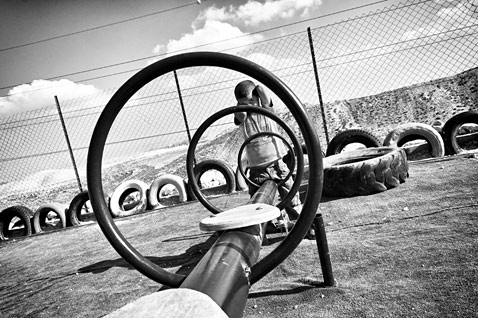
Ahmad, 5, in the kindergarten playground that is being demolished by order of the Israeli Civil Administration. (© Giuliano Camarda)
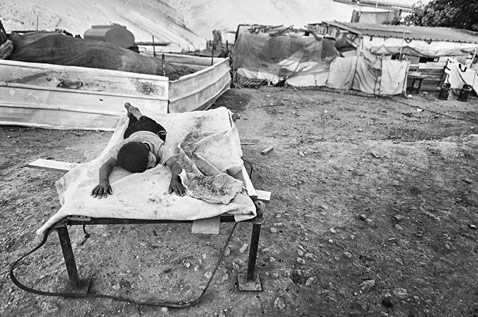
Mohammad, 8, lies on a cot at the Khan al Ahmar Bedouin community. (© Giuliano Camarda/Redux)
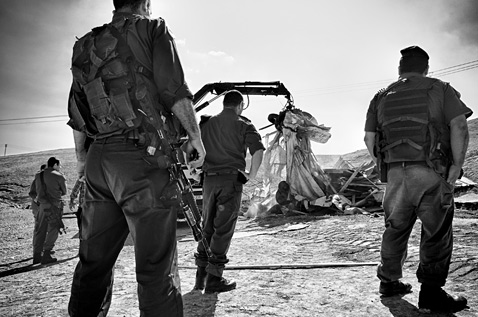
Israeli military forces look on as a house is demolished in Mitawish. (© Giuliano Camarda/Redux)
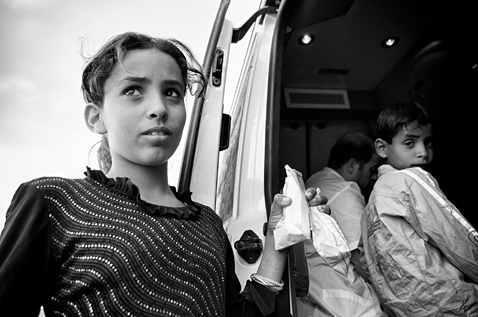
A Bedouin girl buys medicine from the Palestinian mobile clinic unit in the village of Abu Nwar. (© Giuliano Camarda/Redux)
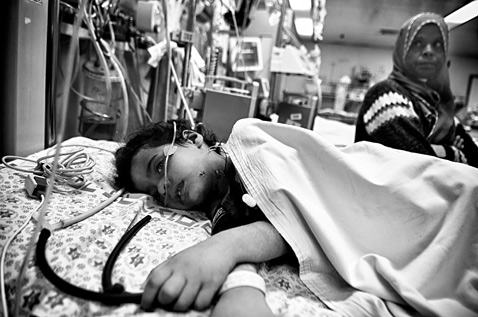
Aseel Ara’ra, 4, is shown in Jerusalem Al Maqassed hospital with her Grandmother Samiha Aseel sitting alongside. She was struck by a bullet while she was playing in Anata, next to the IDF training camp of Anatot. The bullet entered her neck smashing the fourth vertebrae of her spine before exiting. Aseel was paralyzed from the neck down as a result and subsequently died on April 3, 2012. (© Giuliano Camarda/Redux)
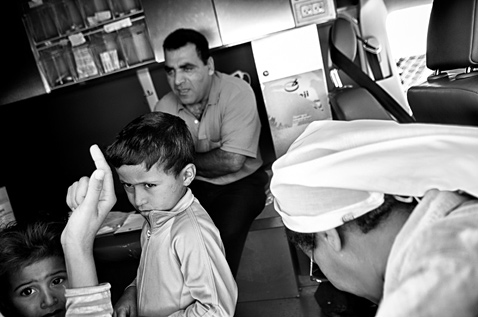
The Palestinian mobile clinic unit is seen during a visit at the Abu Nwar Bedouin community. (© Giuliano Camarda/Redux)
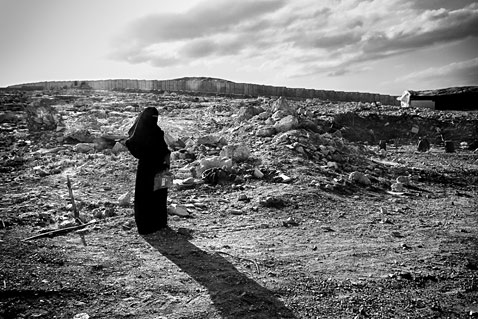
A Bedouin woman waits for a bus next to the Anata community. (© GiulianoCamarda/Redux)
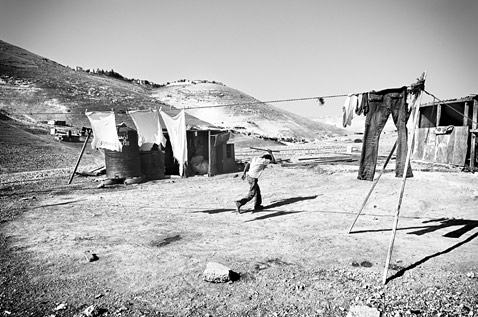
A child plays with a stick at the Wadi Abu Hindi Bedouin community. This area has no electricity or running water and is located next to the largest garbage dump in Jerusalem. (© Giuliano Camarda/Redux)
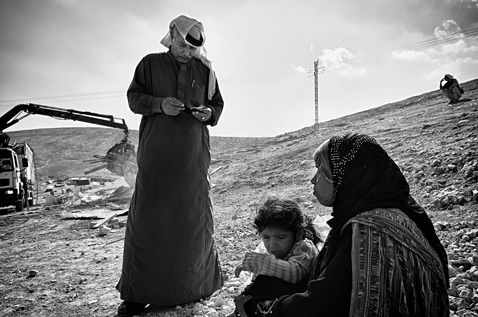
A Bedouin family from the Mitawish community can do nothing as their house is demolished by Israeli military forces. (© Giuliano Camarda/Redux)
0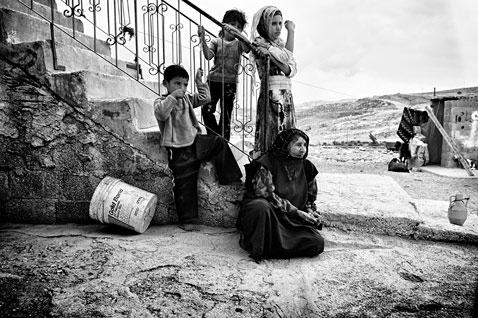
Fatimah Ka’abneh, 80, looks on with her two nephews and a niece after Israeli military forces demolished the home where she lived with her husband for 16 years in Jaba’ Ramallah. (© Giuliano Camarda/Redux)
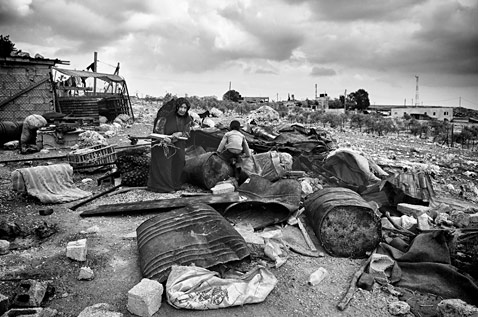
Fatimah Ka’abneh, along with her nephew, collects her belongings after her home was razed. (© Giuliano Camarda/Redux)
Giuliano Camarda was born in Rome in 1978. He received a Master’s degree in photojournalism from the Contrasto Agency in Milan in 2009, and has collaborated with various NGOs, focusing on projects with social and humanitarian relevance. His photos have been published in National Geographic Italia, Repubblica.it, Sky TG24, Witness Journal and ZOOM.
 APJP |
APJP |  Post a Comment |
Post a Comment |
Reader Comments